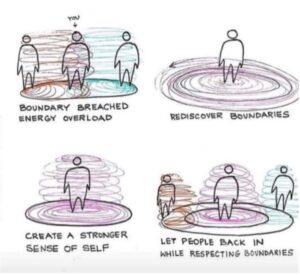World Mental Health Day 2023
The World Health Organisation (WHO) recognises World Mental Health Day on Tuesday 10th October this year.
Mental health affects each and every one of us and World Mental Health Day 2023 is a chance to discuss mental health and how important it is to talk and get support if you or someone you know is struggling.
People who have been affected by domestic abuse are at a higher risk of experiencing mental health difficulties and suffer from mental health diagnoses such as PTSD, anxiety, and depression.
It is important to protect our mental health and prevent future problems. It’s a bit like brushing your teeth daily – this is important in preventing issues with our teeth; it’s the same for our mental health. There is a wide variety of activities that we can put in place to help prevent mental health problems, and it can also be fun!!
Hatty, our Lead Art Therapist at NIDAS has given us her 10 top tips to improve mental health and wellbeing.
-
Get Closer to Nature
Nature can have a really calming effect on us. We have been living around other animals and plants for thousands of years. Taking a stroll amongst nature can help us to feel calmer, more hopeful, and less alone. We all have different reasons for wanting to connect with nature and you may find doing things such as growing your own vegetables or flowers, exercising outdoors, or being around other animals can have lots of positive effects on your wellbeing. Getting outside to experience the nature around us can also generate joy, creativity, as well as facilitating our concentration.

-
Talk to Someone you Trust
Many of us learn to bottle up our feelings and emotions because we often try to ignore them. However, what happens when it all gets too much to handle? Where do these feelings go? How does this make us react? It can take a lot of strength and courage to talk to someone about how you are feeling or what you are finding hard as it shows your vulnerability, however, by sharing and talking about your concerns or issues with a person you trust can really help and make you feel relieved. You are not alone and talking can help change how you see and feel about your situation(s) in ways you may find helpful.

-
Plan Things to Look Forward To
Life throws all sorts at us, and during difficult times, we may feel hopeless and not have the energy to plan for the future. When we have exciting things to look forward to, this can help us to cope with difficult situations. Making plans for activities we enjoy can increase our sense of hope, which is important for our mental health. You can plan for small pleasures, such as having a cup of tea with a friend, watching your favourite TV programme, going for a walk, planning a trip to see family or friends, arranging a trip to the cinema, or getting your nails done. Whether the activity you plan is big or small, the important thing is to plan it so that you have something to look forward to.

-
Get More from Your Sleep
Getting enough sleep is important for our mental health. If you struggle with sleeping, you will know what a difference it makes to our body, our mind, and our ability to cope with life. Adults need between 7 – 9 hours sleep each night, including dreaming sleep and deeper sleep. If sleep is something you find difficult, it can be helpful to develop a relaxing bedtime routine to help you to start to wind down before you go to sleep. Embedding consistent times to go to bed and wake up can help to set the body clock – your body will get into a routine, which will help you to sleep better. Avoid screens, alcohol, and caffeine before going to bed as these can stimulate the mind and body, reducing your ability to fall asleep and have a good quality rest. Listening to relaxing music or white noise, as well as performing a mindful body scan will not only help with getting to sleep, relax your body and mind.

-
Get Creative
Getting in touch with your artistic side can help you to feel calmer and more relaxed. Engaging in art can offer you therapeutic qualities and mindfulness. You could try painting, drawing, making crafts, clay, colouring, making slime etc. One of my favourite activities is creating a mandala. A mandala is a sacred space, often a circle, which reveals some inner truths about you and the world around you. Colouring a mandala can be meditation for yourself and it can be very calming.

-
Practice Mindfulness
Mindfulness is a way of paying attention to the present moment, using techniques like meditation, breathing, and yoga. It helps us become more aware of our thoughts are feelings so that, instead of being overwhelmed by them, we’re better able to manage them and keep our mental health in check and reduce stress. One of the simplest techniques to use is focused breathing. Learning to breathe more deeply can help you feel a lot calmer quite quickly and can be done anywhere. Breathe in though your nose and out through your mouth, and try to keep your shoulders down and relaxed and place your hand on your stomach – it should rise as you breathe in and fall as you breathe out. Count as you breathe. Start by counting ‘one, two, three, four’ as you breathe in and ‘one, two, three, four as you breathe out. Try and work out what’s feels best for you.

-
Take Up a New Hobby
Spending time on an activity that you enjoy can improve your mental health and wellbeing. In fact, individuals participating in a hobby may be less likely to experience stress, low mood, and depression. Finding a new hobby can make you feel more motivated, feel better connected to your community, and bring you joy and happiness. Journaling is a powerful tool that allows you to work through feelings and reflect on events you may have experienced. Cooking and baking can be a great hobby and many people find it therapeutic. Other ideas could be reading, strategy games, exercise, and arts and crafts.

-
Listening to Music
Music can be a fantastic relaxing activity. It connects you to your emotions and distracts you from worrying thoughts. Take some time during the day to listen to your favourite songs, whether that’s in the shower, in the car, or in the living room. You can dance and sing along, or just relax and enjoy. Listening to music can also be a very good grounding technique and make you feel more present. Really listen to the music. Can you pick out different instruments? Can you hear a beat or certain rhythm? Focus on the music and let your other thoughts float and fade away.

-
Picture Yourself Somewhere Safe and Calm
Even if you can’t get away, your imagination can transport you to somewhere you feel safe and calm. This technique is called visualisation and can be extremely helpful in stressful situations and can quickly make you feel calm and relaxed. All you need to do is close your eyes and think of somewhere relaxing, safe, and peaceful. You might choose a memory of somewhere you’ve been or a place you have imagined. Closed your eyes and think about the details of this place. What does it look like? What kind of colours and shapes can you see? Can you hear sounds? Is it warm or cool? Let your mind drift and your body relax. To take this exercise further, you could then draw or paint your safe and calm place and then put it up somewhere in the house as a reminder.

-
Learning to put in Healthy Boundaries
Setting healthy boundaries requires self-awareness. When setting boundaries, you need to be clear about the expectations for yourself and others, and what you are and not comfortable with in specific situations. Sometimes it is okay to give yourself permission to say no. Setting healthy boundaries requires good communication skills that convey a clear understanding of what you need. There are some steps to setting healthy boundaries and these include, listing your most important priorities, paying attention to your intuition, assume responsibility for your needs, practice saying no, use I-statements, avoid excessive apologising, and be consistent with implementing your boundaries. Why not give it a go.
